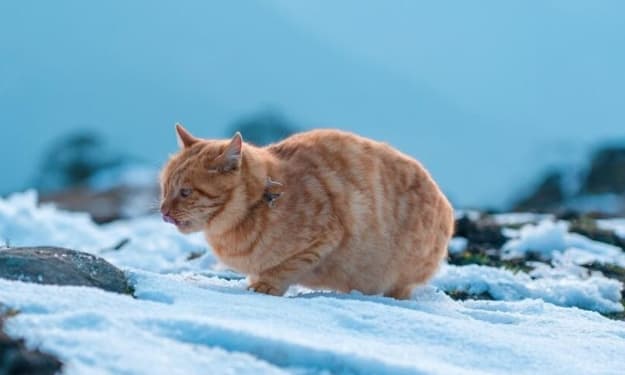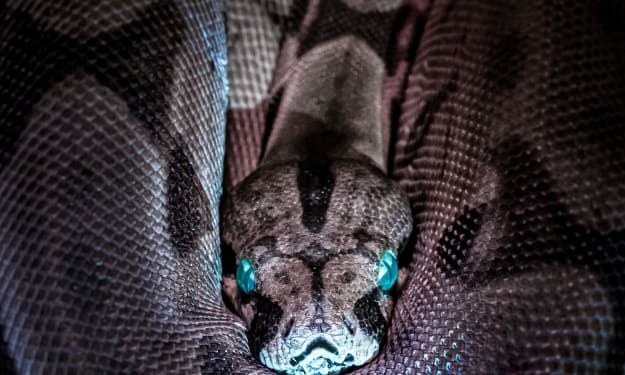Cat anxiety when the relief method
Hair licking behavior can relieve cat stress

By observing a cat's licking behavior, the owner can better understand the cat's emotional changes. When a cat is nervous and upset, he or she will lick for longer periods and will extend the area of his or her coat. If you look closely at these details, you will know exactly when your cat is in a state of anxiety, and you can eat or interact with your cat to relieve stress and help your cat get out of anxiety.
How to relieve stress in anxious cats
During cold weather, anxious cats prefer to lick their fur for longer periods to relieve stress. Under normal circumstances, licking can help accelerate the cat's circulation and metabolism, which is one of the means to directly help the cat reduce stress. In addition, licking the cat's fur can effectively eliminate some of the odd odors that coat the cat's fur, which can also reduce some of the cat's stress.
A more important effect comes from the temperature. By licking the cat's fur, the cat can keep it in a softer and neater state, when the amount of air between the fur is more reasonable. At this time, the cat's fur will be better to keep warm, and this moderate increase in temperature can effectively relieve the cat's stress.
Amid stress, young cats do not show a significant increase in hair licking, which is because young cats need the help of older cats. But you will see an alternative situation where the kitten will frequently walk around the big cat or the popper cooper at this time. At this point, the popper cooper can also effectively relieve the cat's stress if he increases the length of time he spends grooming the kitten.
Male cats will deliberately choose the middle area of the cat's territory or the edge of the cat's territory when increasing the length of time for licking hair. This is the cat deterring other animals or other cats outside the territory, and this deterrence can relieve part of the cat's stress. However, in reality, if a source of pressure that makes the cat very upset is encountered, the male cat cannot remain so brave, and at this time the male cat will choose a quiet and secluded place to lick its fur.
The male cat's hair-licking behavior under stress will have some changes, the male cat will sometimes narrow the area, and each male cat will have its behavior and habit characteristics. This means that each male cat will have a more preferred area to lick hair under pressure, for example, some males will prefer the right side of the cat's paw, while others prefer the upper side of the cat's abdomen.
Unlike male cats, female cats will first choose the quietest and most comfortable location. Female cats will rarely go to the edge of their territory to do so. When in a bad mood, female cats will lick their fur more frequently, so the length of time a cat licks its fur in a single session will not necessarily change significantly. This change is sometimes not obvious in domestic cats, because the effect of the popper cooper grooming the cat is similar to the effect of the cat licking, and sometimes the cat gets groomed by the popper cooper when it is in a bad mood, so the cat quickly relieves stress and is happy again.

Cat licking for emotional relief
Experienced cats will choose warmer places, and in very hot times, cats will choose better-ventilated areas. So when a cat is upset and stressed, in the fall and winter the cat will choose a sunnier area or near a heater in the winter, while in the summer the cat will choose a window.
The cat's hair licking behavior to relieve stress is generally divided into 2 to 5 intervals. During these periods, the cat will mainly lick the hair behavior, but will also intersperse the cat's proceeding behavior and drinking water. Many cats will eat briefly between licking, which is one of the cat's actions to relieve stress. By licking the fur in conjunction with eating, the cat can come out of a depressed mood more quickly.
Avoid giving your cat stress increments when you see it licking its fur because it is in a bad mood. Common stressors include yelling at the cat and constantly shooing the cat. These two behaviors are common in some popper coopers' homes and can cause the cat to be unable to get quiet time to relieve stress by licking its fur. When a cat is very anxious, the owner can hold off on grooming the cat because the act of grooming the cat will cause more stress in some cats. Letting the cat lick its fur quietly is a better option, as the cat can better choose the length of time and find a more suitable rhythm for the cat's mood recovery.
Older cats prefer to be in a corner when licking because they want to find a safer place. This is usually a place where people seldom pass by and when you see a cat licking its fur, you can tell that it is in a very bad mood. Older cats are happy to lick their hair for a longer period, even if the cat has been in the state of licking hair for more than ten minutes. During this period, the popper cooper should reduce the disturbance to the cat. You don't need to put some food in front of the cat either. For these older cats, food is no longer a good way to help relieve emotional stress.
If you have a lot of cats in your home, you need to provide a separate area for those cats that are in a bad mood. If the cat is stressed but always disturbed by other cats, then the cat's stress will only increase. Cats need a relatively quiet and separate space when they are licking their fur. The popper cooper can give tacit permission for the cat to enter the room where the popper cooper is resting at this time, sometimes other cats do not come here often, so for a shorter period this AR, ea forms a separate space for the cat to relieve its emotions.
The popper cooper can also quietly open some places where cats are not normally allowed to go so that these emotional cats can temporarily rest here. However, doing so also tends to attract the interest of other cats, and often these places end up becoming playgrounds for other cats in the home. To better help stressed cats relieve their emotions, popper coopers can also change the temperature of the house appropriately. In the middle of the cold season, higher indoor temperatures are good for cats to feel happy. You can temporarily close a few windows to avoid the cold wind from blowing to the cat's resting place. This can reduce the cat's stress and improve the cat's mood.
And in the summer heat, when the popper cooper finds a cat at home in a bad mood, you can properly open a few more windows, through the effect of increased air circulation, can help the cat to relieve stress. You can also use some interesting methods, such as providing a softer mat to a cat in a bad mood, which will make the cat feel happy. It is best to have a mat that allows the cat to scratch so that the cat can rest here can also scratch here, many cats will be in a happy mood as a result. The popper cooper can also increase the length of interaction with the cat, but this should be done by observing the cat's emotional state and not doing so if the cat is still angry. If your cat has gradually regained its composure, then you can use this time to play with your cat so that it can quickly return to its normal emotional state, and by doing so, you can make your cat forget its unhappiness with you and re-establish a friendship with your popper cooper.
About the Creator
Diane Dora
man may lead a horse to the water, but he cannot make it drink.






Comments
There are no comments for this story
Be the first to respond and start the conversation.